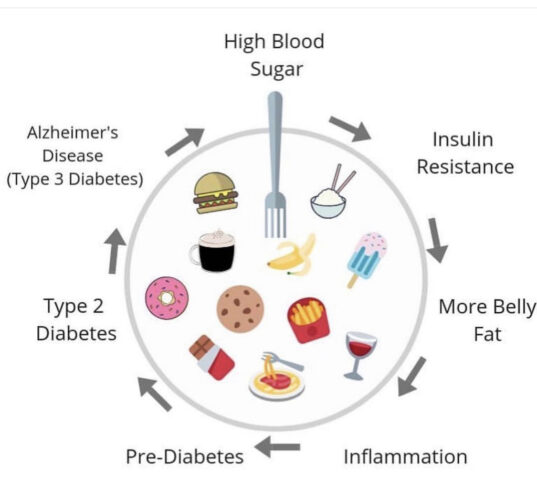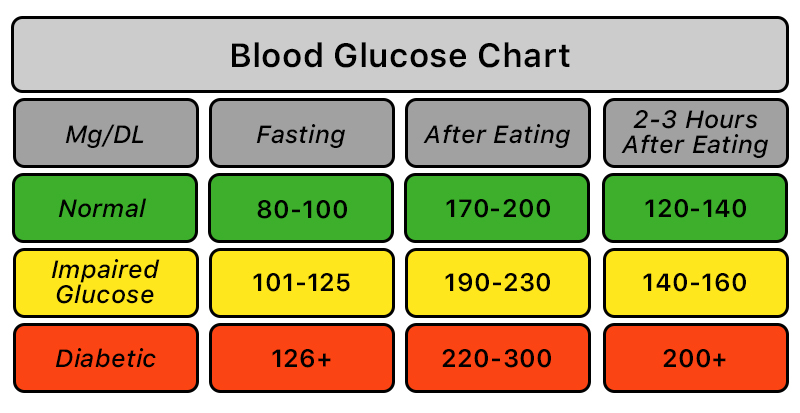Does this sound like you?
- trouble losing weight
- increase in belly fat that won’t go away
- energy crashes, especially at 3pm
- waking up at night with your mind racing, usually around 2am
- sugar cravings
- feeling ‘hangry” (hungry & angry)
There is one single factor these issues have in common, and that’s blood sugar. Stable blood sugar will help you lose weight, improve your mood, boost your energy, and even get better sleep at night. Here’s everything you need to know to balance your blood sugar naturally for weight loss and optimal health.
Blood Sugar Blues
When your blood sugar is well controlled, meaning it doesn’t fluctuate much during the day, you have stable energy, you sleep well, your metabolism is working correctly (you’re burning glucose and fat for fuel), your hormones are balanced, and your appetite is well managed. When you have high blood sugar or blood sugar that fluctuates too much, meaning it spikes too high and then crashes too low, you get energy surges followed by a crash with intense hunger and irritability. You crave sugar, because your body knows that’s the fastest way to boost blood sugar that’s dropped too low. Sugar is also a quick energy source for fuel. You may wake up in the middle of the night when your blood sugar drops too low. This is called nocturnal hypoglycemia.
Here are some signs your blood sugar is out of whack:
- sugar cravings
- elevated fasting blood glucose over 95 mg/dL
- trouble losing weight, weight loss resistance, weight gain
- metabolic syndrome
- high blood pressure
- increase in belly fat or an apple shape
- irritability, feeling “hangry”
- brain fog
- wake up around 2 or 3am feeling wired
- energy spikes and crashes
- always hungry
- anxiety
Why Does Blood Sugar Matter?
Weight gain, diabetes, and insulin resistance, collectively known as diabesity, are the single biggest global health epidemics of our time. Diabesity is a leading cause of heart disease, dementia, cancer, and premature death and is almost entirely caused by environmental and lifestyle factors (source). It is also nearly 100 percent preventable and curable.
There is a common denominator in diabesity: high blood sugar levels. Let’s start at the source!
High blood sugar and blood sugar that rollercoasters throughout the day and night, fluctuating outside of optimal ranges, is the biggest reason I see that people struggle with diabesity, weight loss, energy spikes and dips, “hanger,” and even sleep disruptions at night. If left uncontrolled, high blood sugar can have serious health consequences.
Blood sugar (AKA blood glucose) is your body’s main fuel source. For healthy weight and energy, your body needs a steady level of glucose to keep your blood sugar relatively stable: not too much, and not too little. We get glucose from the food we eat, mainly carbohydrates that become sugar as the body breaks them down after you eat them. (Remember that anything that is not a protein or a fat is a carb: think vegetables, fruit, grains, beans, sugar). This sugar is an energy source that provides you with nutrients. The absorption, storage, and production of glucose is tightly regulated by complex processes involving the small intestine, liver, and pancreas.
When there isn’t enough sugar in your bloodstream, your liver can make ketones from fat to use as fuel, a process called ketogenesis. The liver can also make sugar out of protein that breaks down into amino acids, a process called gluconeogenesis. These two processes prevent your blood sugar from dropping to dangerously low levels when there aren’t carbs or food readily available.
Your body works really hard to maintain stable blood sugar, because if it drops too low, you’ll go into a coma, and if it’s chronically too high, you’ll eventually have diabetes, which can cause nerve & organ damage and, if left uncontrolled, death. Healthy blood sugar levels are one of the most important keys for metabolic health: healthy blood pressure, weight, and heart health.
Fasting blood glucose is the easiest blood biomarker to diagnose diabesity, which increases your risk for heart disease, dementia, and many other chronic diseases. (source) Uncontrolled high blood sugar eventually causes diabetes but also contributes to (or directly causes) inflammation, heart disease, Alzheimer’s, weight gain. So keeping blood sugar within optimal ranges is the best way you can manage your disease risk and keep your weight in check.
What Causes High Blood Sugar?
Blood sugar levels fluctuate all day long, BUT they shouldn’t spike and remain high or rollercoaster in and out of healthy ranges all day. They should be on the lower side in the morning when you wake up, then they rise after you drink caffeine, eat, or exercise. But they shouldn’t rise too high in response to these activities, and they should fall back into a normal range within a few hours of eating or exercise. Blood sugar is poorly controlled if it spikes too high and stays high, or spikes too high then falls too low (hypoglycemia).
The main cause of high blood sugar is consuming too many refined carbs like white flour, soda, processed food, and too much sugar. Eating too many carb-rich foods like pastas, bread, pastries, bagels, cereals–the base of our Standard American Diet--causes high blood sugar and weight gain (and eventually diabetes) because we are taking in more glucose (remember that carbs break down into glucose) than our body can use for energy. The rest is stored as fat, and blood sugar rises.
Stress, poor sleep, illness, surgery, PCOS, pancreatic diseases, certain meds, alcohol, being sedentary, and caffeine also cause blood sugar spikes. It can also get complicated when certain foods we’ve been told are healthy, like oatmeal, legumes, fruit, or sweet potatoes, cause blood sugar to rise outside normal ranges.
Weight Gain & Insulin
The biggest issue I see with my clients is they report they’re doing everything right, but they can’t lose weight. They have trouble sleeping. They’re stressed and anxious. They’re noticing more belly fat.
Every time you eat, your pancreas produces insulin, a hormone that helps move glucose into your cells where it’s used for fuel. In healthy people, blood glucose levels are regulated by the hormone insulin to stay at a steady level of 80–100 mg/dL. The problem with weight gain starts with insulin resistance, in which your cells no longer respond to the hormone. The cells shut the gate and don’t allow any more glucose inside because they already have enough. The cells become resistant to insulin, and glucose builds up in the bloodstream. Now your blood sugar is elevated and you’re insulin resistant. Even worse, insulin resistance and the accompanying high blood sugar cause weight gain, especially in the midsection.
Insulin causes weight gain when the cells absorb too much glucose that isn’t needed for energy, and the body converts this unneeded glucose into fat to store.
Healthy & Optimal Blood Sugar Ranges
Safe levels of blood sugar are high enough to supply your organs with the sugar they need, but low enough to prevent symptoms of hyperglycemia (high blood sugar) or complications of diabetes. This is regulated by your endocrine and digestive system.
Conventional medical ranges say that a blood sugar level less than 100 mg/dL is normal fasting (8 hours after your last meal), Levels between 100 and 125 mg/dL indicate prediabetes. Levels equal to or greater than 126 mg/dL are diagnostic for diabetes.
Fasting blood sugar is considered borderline high when it’s between 100-125 mg/dL, and anything above 126 mg/dL is high. People with borderline high fasting blood sugar may be considered to have prediabetes. Postprandial blood sugar (blood sugar after eating) is considered high when it’s above 140 mg/dL within two hours of starting a meal.
What’s important to know is that In functional medicine. there is a more tightly controlled optimal range in which you want your blood glucose both fasting and after meals (post prandial). Here are the optimal ranges for blood sugar:
Optimal: 72–85 mg/dL
May have increased risk of prediabetes: 90–100 mg/dL
Prediabetes: 100–125 mg
Diabetes: >125 mg/d
Once fasting glucose has gotten to 100 mg/dL, you probably have insulin resistance. (source) Make sure you also request hemoglobin A1c (HbA1c) next time you get blood drawn. A way to measure blood glucose averages over the preceding three months. The optimal range is under 5&, and normal is under 5.5%.
See more on optimal lab ranges for metabolic health here.
How to Balance Your Blood Sugar Naturally
The goal is in balanced blood sugar is to determine your carb tolerance: how many carbs you need in a day to fuel you, yet not too many to cause elevated blood sugar. This will help you maintain stable blood sugar day to day.
Your first step to balance your blood sugar is to determine your fasting and post prandial blood sugar levels. Get yourself a glucometer and check your blood sugar first thing in the morning before you eat breakfast or drink anything but water. This is your baseline. Then measure blood sugar 1-2 hours after eating. It should be 140 or below, ideally 110-120. Measure it again 3-4 hours after eating and it should return to your baseline range (80-90 is OK). If you hit these targets, you’re great! If not, let’s take a deeper look.
You can also use a continuous glucose monitor that you stick to your arm, and it collects data on your blood glucose levels throughout the day and night which it sends to your phone. There are many options available via google or prescription.
If you’re not meeting the target levels, start by removing the main foods that spike blood sugar:
- Refined carbs like white bread, pasta, white rice, pastries
- Soda, fruit juice, and sugar sweetened beverages
- Fast food
- Tropical fruits
- Idaho potatoes
- Sweetened yogurt
- Cow’s milk products
- High glycemic foods
- Alcohol
Secondly, focus on a lower carb diet (under 100g carbs per day). Make these carbs mostly leafy and crunchy veggies like leafy greens, salad greens, cruciferous. Here’s a list of non-starchy veggies. Limit your starches (potatoes, grains, legumes). You’ll need to eliminate or dramatically cut down on grains. Some “healthy” grains like oatmeal and brown rice can cause blood sugar spikes in certain people. Just read this article with my personal story for more on that.
Eat an anti-inflammatory diet with all kinds of protein and healthy fats, mostly olive oil and coconut oil. Increase protein, but note that too much protein can raise blood sugar too. That’s why it’s crucial to test with your glucometer until you discover your ideal diet. You’ll need to measure your blood sugar every day when you wake up (fasting) and then again after meals for several weeks. This will help you identify which foods may be spiking your blood sugar.
Third include plenty of foods that lower blood sugar:
- Cruciferous veggies, especially broccoli
- Nuts & seeds, especially walnuts & chia
- Fruits: avocado & blueberries
- Nopal cactus: have been shown to decrease blood glucose levels by 17% – 46% in some patients
- Cinnamon: add to smoothies with avocado and blueberries
- Apple cider vinegar, a splash in a glass of water 1-2 times daily, especially when the sugar cravings hit
- omega 3 rich foods like salmon & sardines
- Certain legumes like lentils (caveat: these may raise blood sugar in some people)
You may find that your fasting glucose is fine but stays too high during the day or takes too long to return to normal. That usually means something you’re eating is contributing to your high readings. Typically it means you’re eating too many carbs for your physiology (starches, grains, sugar); too much protein; or you’re stressed during the day. If your morning readings are high you may not be getting restful sleep.
I mentioned earlier that I often encounter people who report they’re doing everything right and focusing only on “healthy” carbs, yet they’re still experiencing symptoms of higher blood sugar (mainly weight loss resistance). Even foods we’ve been told are healthy may spike blood sugar.
Unsuspecting foods that may spike blood sugar:
- Rice milk, oat milk
- Legumes
- Grains, including gluten free grains
- Oatmeal
- Sweet potato
- Too much protein for your unique physiology
- Gluten free flours: blends with potato starch and/or rice flour
- Paleo starches like cassava, tiger nut
- paleo “healthy foods” like cauliflower pizza crust and keto treats
Also note that poor sleep, stress (increased cortisol), intense exercise, and illness can raise your blood sugar. Exercise in general lowers blood sugar in the long run but may elevate it right afterwards.
Focus on these lifestyle strategies to balance blood sugar:
- Get restful sleep. Tips here.
- Eat in regular intervals: one way to manage blood sugar is to make sure you don’t skip meals or eat erratically
- Exercise lowers blood sugar. Get active! Even if it’s just a 15 minute walk to start.
- Stress relief. Stress causes high cortisol which raises blood sugar.
If you cannot get a glucometer, you can gauge your carb tolerance with food, but it is not an exact science. Read how to do that here.
Supplements to Lower Blood Sugar
Along with diet, certain supplements will help lower and stabilize blood sugar.
- Top prize goes to berberine (read my post on it here), an amazing herb that may lower blood sugar as effectively as a drug. Try this supplement that combines berberines with the powerful antioxidant alpha lipoic acid as well. It’s beneficial for diabetes, pre-diabetes, insulin resistance, elevated triglycerides.
- My favorite blood sugar balancing supplement combines chromium with other trace minerals and cinnamon to help stabilize blood sugar levels. Bonus: it reduces sugar cravings!
- Omega 3s, like this fatty acid, to reduce
- Magnesium. People with diabesity tend to have lower levels of magnesium. I recommend this magnesium.
- This multi is specially formulated to support healthy blood sugar and insulin levels.
Bottom Line
If you struggle with weight loss resistance, metabolic syndrome, or diabesity, your blood sugar and insulin levels are likely out of whack. it can be frustrating if you’re eating “healthy” foods like oatmeal and sweet potatoes and still experiencing symptoms of high blood sugar. But remember that foods affect every person differently. We all have unique needs for varying amounts of protein, fat, and carb. Your daily oatmeal or your high carb vegetarian diet could be unwittingly spiking your blood sugar. With some experimentation and a glucometer, you can best determine your ideal carb tolerance and keep your blood sugar balanced throughout the day and night.
Pin it!

Mary Vance is a Certified Nutrition Consultant and author specializing in digestive health. She combines a science-based approach with natural therapies to rebalance the body. In addition to her 1:1 coaching, she offers courses to help you heal your gut and improve your health. Mary lives in San Francisco and Lake Tahoe in Northern California. Read more about her coaching practice here and her background here.









